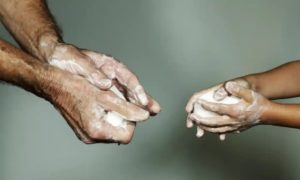

If you have access to soap and water, it’s just as good if not better than disinfectants. It’s all about a basic aspect of organic chemistry which is lipid solubility. Soap dissolved fats and oils which are a key component of the virus shell.
Viruses can be active outside the body for hours, even days. Disinfectants, liquids, wipes, gels and creams containing alcohol are all useful at getting rid of them – but they are not quite as good as normal soap.
When I shared the information above using Twitter, it went viral. I think I have worked out why. Health authorities have been giving us two messages: once you have the virus there are no drugs that can kill it or help you get rid of it. But also, wash your hands to stop the virus spreading. This seems odd. You can’t, even for a million dollars, get a drug for the coronavirus – but your grandmother’s bar of soap kills the virus.
So why does soap work so well on the Sars-CoV-2, the coronavirus and indeed most viruses? The short story: because the virus is a self-assembled nanoparticle in which the weakest link is the lipid (fatty) bilayer. Soap dissolves the fat membrane and the virus falls apart like a house of cards and dies – or rather, we should say it becomes inactive as viruses aren’t really alive.
The slightly longer story is that most viruses consist of three key building blocks: ribonucleic acid (RNA), proteins and lipids. A virus-infected cell makes lots of these building blocks, which then spontaneously self-assemble to form the virus. Critically, there are no strong covalent bonds holding these units together, which means you do not necessarily need harsh chemicals to split those units apart. When an infected cell dies, all these new viruses escape and go on to infect other cells. Some end up also in the airways of lungs.

